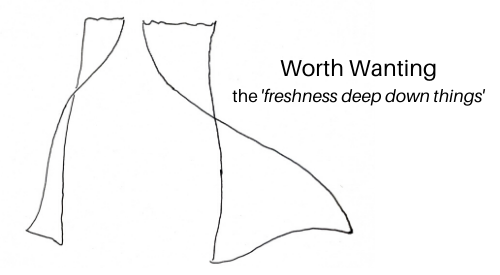
That “It’s you, I know you’re there, I see you” glance is the epitome of the encounter. Reciprocated, it is an entanglement. Mundane moments pass, but such an encounter, ‘officiated’ by freshness, is ever lasting.
But, you (and I myself) ask: what about the Macbeth glance. What I mean is that glance of mutual complicity the two regicides shared. Does it represent an encounter?
The more formal description of an encounter–an occasion of making common cause with the livingness of an other or otherness addressed as you–explains why the answer is ‘no, it is not’.
Even the briefest locking of eyes that mints an encounter has concentric waves of implication, articulated or not, extending out as far as to encompass all mankind, or beyond.
To begin with, there’s we two at the center, directly face to face, eye to eye. But also implicated are the KNOITs (kin groups, neighborhoods, organizations, institutions and traditions) we share membership in, and have some responsibility for. The common cause we make with each others’ livingness has to be consonant, even if indirectly, with the common cause we together make with the livingness of our common KNOITs, and the other members.
There is the further circle of those implicated in our encounters: the members of those NOITs we neither of us belong to. These are not only indirect but also indefinite participants in our encounter with each other. The common cause we make with the one right in front of us has to be consonant with our concern for the livingness of those more distantly implicated who could be ‘anyone.’
Or, to turn it around, the common cause we make with the livingness of all strangers and with our community fellows has to be at least consonant with, if less intense or vivid than, that which we make with each other in that ‘You!’ glance.
“Has to be..” Why? This is how freshness works. Hospitality, friendship and exploration are its modus. These absent, it isn’t an encounter, and encounters are freshness’ passion.
But let’s go farther. What does ‘making common cause with livingness’ actually mean? There are many stances of solidarity we can take with the livingness of another, teaching, listening, commiserating and so on, but solidarity with respect to what? And how might this solidarity apply to people we’ll never even know?
Livingness is not a measure of our degree of openness to others and othernesses, to what is and what can be, but rather of our capabilities for dynamic response as we show it when we encounter.
I have a trainer who makes common cause with me concerning my physical capabilities. Together we work on balance, agility, stamina, strength, and…oooh, aaah….flexibility. All of these ‘fitness’ concepts can apply to livingness, and I’d throw in sensitivity, delicacy, and confidence as well. We can respond to others and othernesses with more or less balance, agility, strength (sufficient perhaps to see as far as the farthest circle of implication), confidence, and so on. This measure is descriptive, not competitive. We each go forward from where we are; there’s always plenty of room for growth.
In encounters, we present ourselves to others, and they to us, and we make common cause with the capability of each to respond to what the other offers, immediately perhaps or over time through reflection. Making common cause with livingness means, at the most general level, making favorable conditions for encounter by everyone, and through hospitality, friendship and exploration, encouraging responses to others and othernesses that expand those capabilities we denote as livingness.
This is what freshness loves and invites us all the time: participation in this intense being-alive. Starting from the direct, and expanding outward circle after circle out to the indirect and indefinite, our encounters exhibit a consonance of concern for livingness local to global, which the glance of the Macbeths conspicuously does not.
